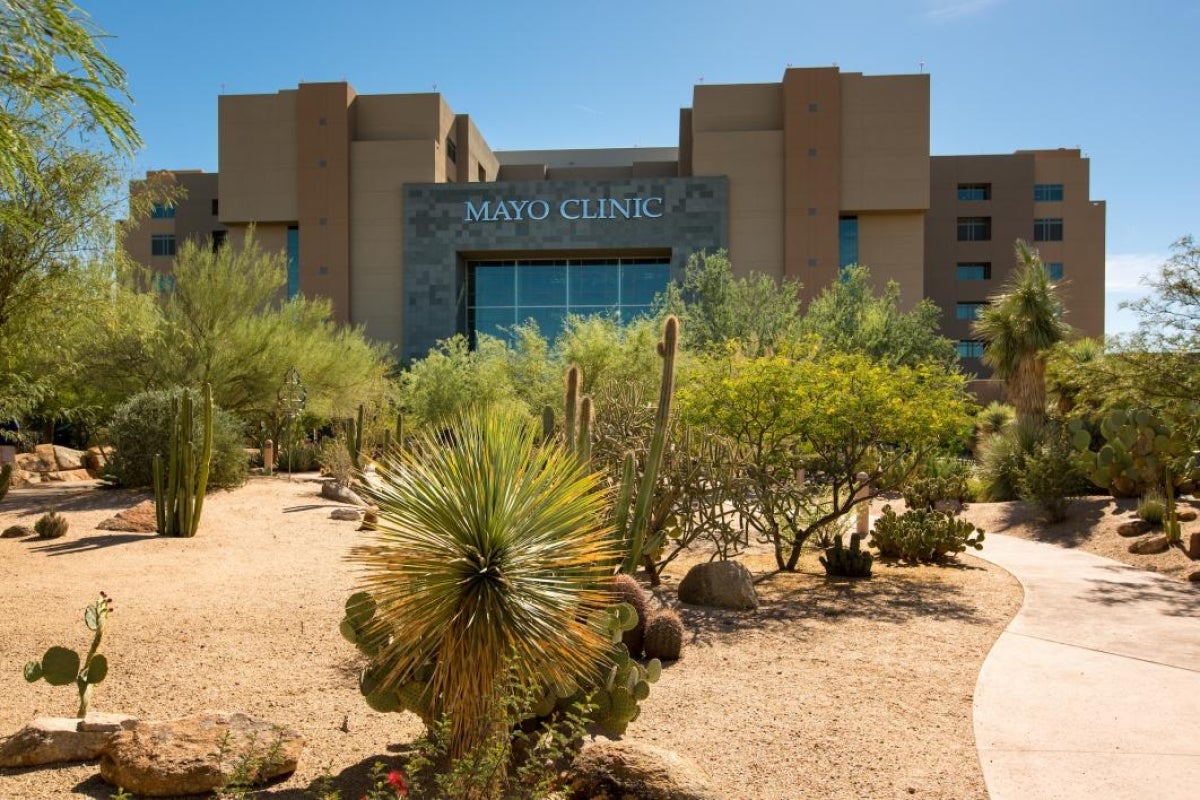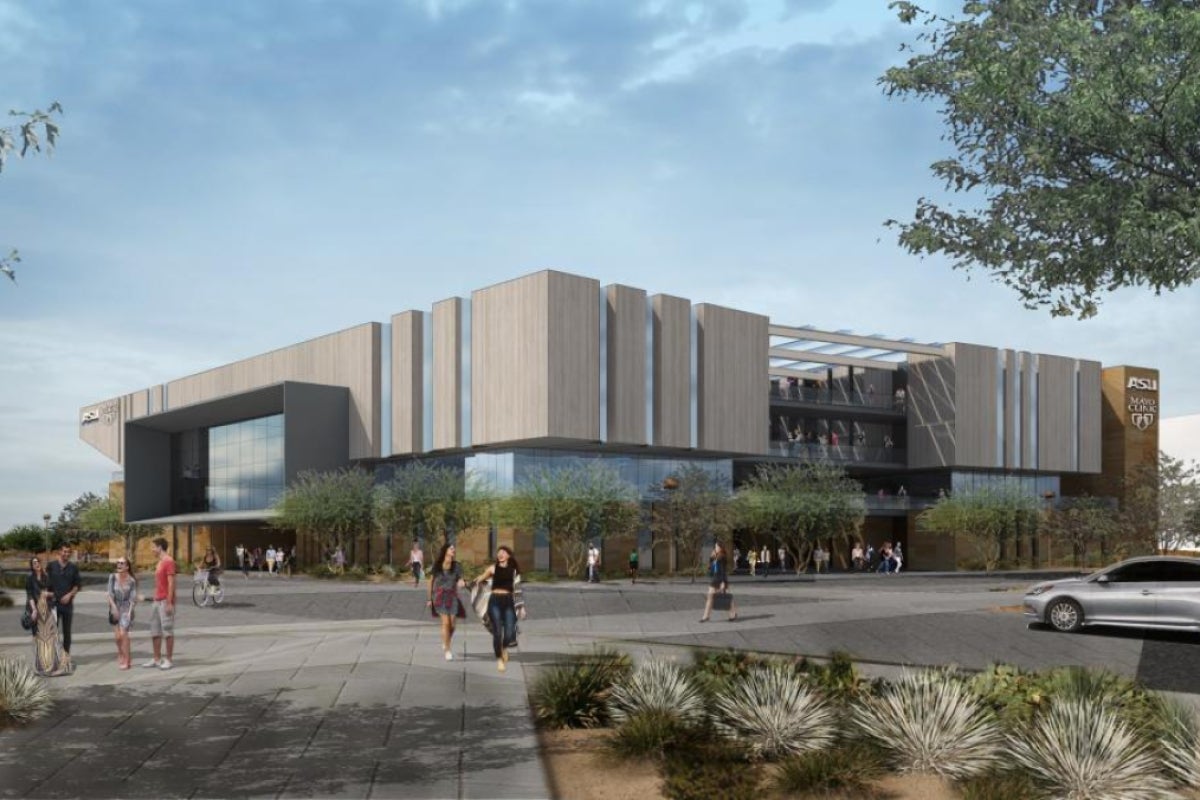Editor's note: This story is being highlighted in ASU Now's year in review. To read more top stories from 2016, click here.
ASU and the Mayo Clinic have formalized a partnership Friday aimed at transforming medical education and health care in the U.S., helping doctors reduce costs, simplify the system and save more lives.
The pairing between the nation’s most innovative university and the world leader in patient care and research brings together all aspects of the field — including clinical, legal and administrative work — under one curriculum.
The Mayo Clinic and Arizona State University Alliance for Health Care will create doctors “more broadly scoped and more empowered to change health care outcomes at the individual scale, change health care at the national scale and help us to be able to afford this fantastic medical care that we all would like,” ASU President Michael Crow said.
The announcement has formalized the alliance after 12 years of working together on programs that range from nursing to medical imaging to regenerative and rehabilitative medicine to wearable biosensors.
As part of Mayo’s new medical school in Scottsdale, the partnership is creating a specialized curriculum and certification in the science of health care delivery. The jointly developed courses will focus on how patients receive care to improve quality, outcomes and cost, Crow said. Students will earn this certificate concurrent with their medical degree from the Mayo Clinic School of Medicine and have the option of pursuing a master’s degree in the program through ASU.
“Our strategy is to educate people differently,” said Victor Trastek, director of ASU’s School for the Science of Health Care Delivery. “To train the health care workforce for the future so that they think differently and can make the best decisions for the patient. And then, hopefully, you’ll get good care for a reasonable price.”
Video by Ken Fagan/ASU Now
The alliance seeks to create a more sustainable system through integration.
“We have found that in health care, going forward, in terms of sustainability, you can’t do it alone,” Trastek said. “So you have this huge, wonderful university, and you have this great medical center. Instead of competing against each other, why don’t we share?”
Evidence of the alliance soon will rise on land owned by ASU in northeast Phoenix adjacent to Mayo Clinic. ASU is planning to build a 150,000-square-foot Health Solutions Innovation Center to deliver a world-class learning environment. The leading-edge facility will feature a med-tech innovation accelerator, biomedical engineering and informatics research labs, and an education zone.
The Health Solutions Innovation Center is scheduled to break ground in 2017.
In addition to launching the Arizona medical school campus and enrolling the first 50 students in Arizona in summer 2017, Mayo Clinic also has a school in Minnesota. All 200 students there are eligible for the certificate.
“The Alliance for Health Care between our two organizations is really a national relationship,” said Wyatt Decker, vice president and CEO of the Mayo Clinic in Arizona. “Mayo Clinic has operations in over five states, including our flagship operations here in Arizona; Rochester, Minnesota; and Jacksonville, Florida.”
He said ASU and Mayo share “a bold vision that will help create legions of doctors that are not only taught in the important skills of diagnosing and treating illness, but also in how to keep populations healthy, and how to keep people healthy, how to work in teams” and use skill from other disciplines, including business, engineering or social sciences, “to measure the system that they’re in and understand it and improve it.”
The newly formalized alliance greatly expands an existing relationship that began more than a decade ago using arts and humanities to deliver “bedside solutions to patients who are anxious” through “shared music or shared creative writing programs,” Decker said.
That has grown, he said, “both through grassroots and strategic involvement of our leaders, and we have quite a broad and deep list of projects and strategic initiatives together.”
One such project is the Mayo Clinic Proton Beam Program, which draws on ASU physicists, engineers and technologists. Another is a $40 million effort to develop a prototype to detect radiation exposure. Other collaborative work involves a range of fields, including biomedical informatics, molecular detection and medical imaging, metabolic and vascular biology, regenerative and rehabilitative medicine, and wearable biosensors and knowledge management.
The formalized alliance, Crow said, grew out of a recognition that U.S. health care needs to evolve beyond individual specialties and organizational walls. “We need to innovate to transform health care and train the next generation of health care professionals who will help lead this change,” he said.
“We do this by, basically, reimagining the physician of the future,” he said, as “not only scientist, doctor, healer, designer, but also engineer, economist, administrator, problem solver, community engager — all those things together.”
At 9:30 a.m. Friday, Crow and Decker will discuss the new initiative live on Facebook at http://www.facebook.com/mayoclinic.
Top image: Artist rendering of the Health Solutions Innovation Center by Architekton
More Health and medicine

The science of sibling dynamics: Why we fight, how we relate and why it matters
We have Mother’s Day, Father’s Day and even Grandparents’ Day. But siblings? Usually they get a hand-me-down sweatshirt and, with any luck, a lifetime of inside jokes.But actually, there is a…

New study seeks to combat national kidney shortage, improve availability for organ transplants
Chronic kidney disease affects one in seven adults in the United States. For two in 1,000 Americans, this disease will advance to kidney failure.End-stage renal failure has two primary…

New initiative aims to make nursing degrees more accessible
Isabella Koklys is graduating in December, so she won’t be one of the students using the Edson College of Nursing and Health Innovation's mobile simulation unit that was launched Wednesday at Arizona…






